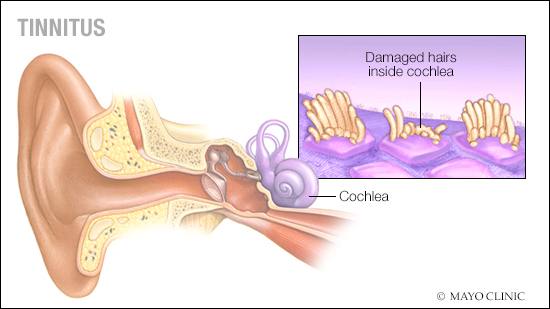-
Featured News
Mayo Clinic Q and A: Understanding tinnitus
 DEAR MAYO CLINIC: What causes tinnitus, and is there anything that can be done to get rid of it?
DEAR MAYO CLINIC: What causes tinnitus, and is there anything that can be done to get rid of it?
ANSWER: Tinnitus — the sensation of hearing a sound when no external sound is present — often is described as a ringing, buzzing, roaring, clicking, humming, pulsing, or hissing sound, or any combination of these sounds. You may hear it in one or both ears. The sound may be present all the time or off and on.
If you have tinnitus that doesn’t go away, a hearing evaluation is recommended. In most cases, tinnitus can be managed fully. But, for some, it’s a chronic condition that can affect sleep and everyday function. Fortunately, there are options to reduce its effects.
The cause of tinnitus is unknown. One idea is that tinnitus results from damage to the cells of the inner ear. This stems from the fact that about 90 percent of people with tinnitus have some hearing loss caused by noise.
The tiny, delicate hairs in your inner ear move in relation to the pressure of sound waves. This movement triggers the release of an electrical signal through your auditory nerve to your brain. Your brain normally interprets these signals as sound. If the hairs inside your inner ear are damaged, bent or broken, they may release random electrical impulses to your brain, resulting in tinnitus.
In many people, tinnitus has been linked to hearing loss — both age- and noise-related. It can occur from earwax blockage, from bone changes in the middle ear (otosclerosis) and as a side effect of a number of medications. Other conditions associated with tinnitus include head trauma or a concussion; inner ear conditions, such as Ménière’s disease or an acoustic neuroma; head or neck injuries; or problems with the joint where your lower jawbone meets your skull (temporomandibular joint). High blood pressure and factors that increase blood pressure, such as stress, alcohol use and caffeine consumption, can make tinnitus more noticeable.
Although there’s no known cure for most cases of tinnitus, many people can manage it. For most, the goal is to lessen their awareness of tinnitus. If tinnitus is due to a health condition, your health care provider may be able to recommend steps that could reduce the noise. This may involve removing excess earwax, treating an underlying vascular condition or changing medications if one is contributing to the problem.
Hearing aids also can help. Properly fitting hearing aids can address hearing loss. And tinnitus sometimes can be reduced if you can better hear sounds around you. In some cases, white noise (masking) may help suppress tinnitus so that it’s less bothersome.
In addition, there are several promising therapy options for management of tinnitus. These include music therapy devices and methods for managing tinnitus; tinnitus retraining therapy, which involves using devices to “train the brain” to ignore tinnitus; and cognitive behavioral therapy, which focuses on replacing negative thoughts with positive ones to change your reaction to tinnitus.
Although there is no approved drug to cure tinnitus, in some cases, medications, such as certain antidepressants, may reduce the severity of symptoms. Ongoing, research-focused tinnitus suppression and management solutions are underway.
Finally, a licensed therapist can help you develop coping techniques. Support groups also are available in person and online. Exercise and relaxation therapy also may help, as stress can worsen tinnitus. (adapted from Mayo Clinic Health Letter) — Dr. Gayla L. Poling, Otorhinolaryngology, Mayo Clinic, Rochester, Minnesota







